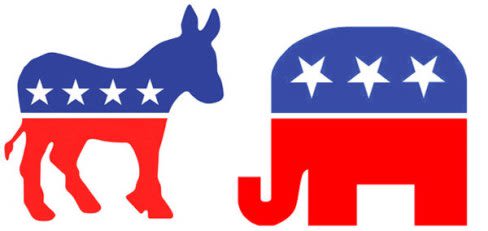First Look: What to Expect in the 2016 Presidential Election
The GOP field grew larger last week with the addition of three new Republican presidential candidates: Carly Fiorina, Ben Carson and Mike Huckabee. They join Ted Cruz, Rand Paul and Marco Rubio among the notable declared candidates for the GOP. Two more serious contenders, Jeb Bush and Scott Walker, are expected to declare soon. Other notable GOP governors that are more likely than not to enter the race are Chris Christie, Bobby Jindahl, and Rick Perry.
On the Democratic side, Hillary Clinton welcomed Bernie Sanders to the race last week. And that’s about it. Martin O’Malley will likely declare at some point but it remains to be seen whether Hillary will face any meaningful competition.
In a year without an incumbent running for re-election, the differences between the Republican and Democratic primary dynamics are striking. I don’t think there is a presumptive favorite for the GOP nomination. Given the lack of a front-runner, grassroots support is highly dispersed at the moment, which allows for just about anyone to claim that they have fighting chance to secure the nomination if they can draw some attention to themselves and gain a little momentum.
And the 2012 primary experience reinforces this. The 2012 GOP primary field saw a parade of candidates get their 15 minutes of fame before ultimately flopping and yielding to Mitt Romney, the establishment candidate that the base refused to embrace. A similar scenario is a possibility in 2016, with Jeb Bush playing the role of Romney. Keep in mind that the first few primaries can be won with a relatively small portion of the overall vote in a crowded field. So the candidates aren’t deluding themselves when they see a window of opportunity in a crowded field. As the field grows, the incentives to grow it further only increase. Get ready for a 2012 redux.
The dynamics couldn’t be more different in the Democratic primary race. For better or worse, Hillary Clinton is a unique candidate. She’s been in the political spotlight (as a First Lady, senator, presidential candidate and secretary of state) for more than 20 years, and she’s been the prospective front-runner for the 2016 Democratic nomination since she lost to Obama in 2008. Views of Hillary are unlikely to be swayed with new information unless the revelations are earthshaking. The grassroots, progressive wing of the Democratic Party would prefer Elizabeth Warren, but Warren is unlikely to enter the race unless Clinton’s campaign implodes before the end of the calendar year. That’s unlikely to happen (her private email imbroglio, fundraising questions surrounding the Clinton Foundation, and pending Benghazi hearings notwithstanding). Still, the Democratic Party would be wise to entice another viable candidate to enter the race if for no other reason than contingency.
My general disclaimer for this blog going forward is that I will sometimes get things wrong. I’ll offer observations and assessments, with predictions based on probabilities rather than certainties. It’s possible for a front-runner to emerge in the GOP primary and run away with nomination. It’s possible for Hillary’s campaign to implode and have it followed by a messy battle with multiple candidates. But I think the more probable scenario is something like the 2012 primary on the GOP side, with Hillary marching to the nomination with minimal primary resistance.
Frank Alcock is an associate professor of political science at New College of Florida, one of the nation’s premiere public liberal arts colleges. He appears regularly as a political analyst with ABC News in Sarasota and speaks on a range of political and public policy topics.


